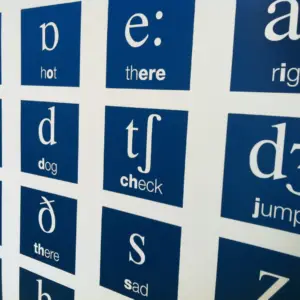Can You Tell the Difference Between
Bitch and Beach?
Many students around the world struggle with these 2 common words. Today we are here to solve that!
Watch the video below to find out more!
Imagine the situation.........
Imagine this situation. You are hanging out with your friends on a nice sunny day and you ask them…
“Do you want to go to the bitch?”
You look at your friends. You expected smiling faces and agreement, however, they are deadly silent. They look at you confused and shocked at what you just said. Why are they upset? It’s a sunny day and the beach will be a great place to spend some time… What did I do wrong this time?
Well, your pronunciation has let you down. You wanted to say beach, you know, the place with the sand and the sea, where you could have had a bloody great time. However what you actually said was bitch… which has a totally different meaning.
Although they do have very different meanings, they actually sound quite similar, so it is easy to see how so many people get them mixed up. There is only one sound that is different, but that difference is huge and it is something you need to work on if you don’t want to end up embarrassed and red-faced. No one wants that!
This is why pronunciation is so important if you want to communicate clearly with people in English! No need to worry though, today you are going to learn how to avoid this problem.
The Difficult Sounds in Bitch vs Beach
The sounds we are going to focus on today are the /i/ and /i:/ sounds. Although they sound really similar, they can cause you some real headaches if you can’t hear or pronounce them clearly.
The first sound, /i/, is a short vowel sound found in words like “bit,” “hit,” and “sit.” On the other hand, /i:/ is a long vowel sound commonly heard in words like “beet,” “heat,” and “seat.” Notice the subtle difference in length between these two sounds.
To properly pronounce /i/ sound, like in the word “bitch”, start by slightly opening your jaw and resting your at the bottom. Then, move your tongue up towards the roof of your mouth, and create a small space for the sound to escape.
As you do this, form a smile with your lips. Now, say the word with a short /i/ sound: “bit-ch.” Remember, it’s important to keep the sound short and avoid stretching it. Check out this diagram for more details.
Next, let’s take a look at the long /i:/ sound which you will hear in the word “beach”. The mouth position is the same as the short /i/ sound we just worked on, but this time you are going to hold the sound for longer.
Remember to keep your jaw relaxed and your tongue up as you make this sound. Make the sound longer and you end up with the word “beee-ch.” Allow the sound to flow smoothly without cutting it off.
If you struggle to tell the difference between these two similar sounds, it can lead to potential misunderstandings and unintended comedic moments. You don’t want to get the words sheet and sh*t mixed up! That would leave anyone feeling like they just want to run away and never speak English again!
To avoid these kinds of situations, it’s really important to master the nuances of British pronunciation. That’s where shadowing can really help you make progress. I have made a shadowing practice for you, just click not he link below.
How Shadowing Will Help With the sounds in Bitch vs Beach
But, “what exactly is shadowing?” I hear you ask… Well, imagine following closely behind a top level athlete, matching their every move and stride. It’s the same idea, just for speaking skills. In the world of language learning, shadowing involves copying the speech patterns, rhythm, and intonation of native speakers. By immersing yourself in their spoken words and imitating them in real time, you’ll power up your pronunciation skills and speak much more clearly. Sounds good, right?
If you want to go one step further, and make progress as quickly as possible, you need to check out my Shadowing Production course. You can take your pronunciation skills to the next level in just 30 days. With a combination of interactive exercises and expert guidance, we will help you refine your pronunciation techniques and develop a keen ear for British sounds. This will help you understand and be understood by native speakers when communicating in English.
Remember, clarity in pronunciation opens doors to confident communication and a deeper understanding of the English language. So why wait? Start your pronunciation journey today and unlock a world of possibilities in your career, relationships, and your everyday life.
To sum up, whether you’re chatting with your mates, making a presentation at work, or communicating with people from around the world, improving your pronunciation skills is a journey worth making. It is one of the building blocks you need to build confident communication skills and be in a position to use your English to improve your life.
Other Posts You Might Like

Chris Pratt and the Essex Accent
Chris Pratt and the Essex Accent Hollywood actors have a unique talent to tell a story through their character’s eyes, using body language, facial expressions,

What is IPA (International Phonetical Alphabet)
What is the International Phonetic Alphabet and How Can It Help with English Pronunciation? The International Phonetic Alphabet (IPA) sets the global standard for pronunciation.
How do Homophones, Homographs and Homonyms Affect Pronunciation?
What Are Homophones, Homographs and Homonyms and How Do They Affect Pronunciation? Homophones, homographs and homonyms form a vital part of English grammar. Words which

Difficult Pronunciation: Bitch vs Beach
Can You Tell the Difference Between Bitch and Beach? Many students around the world struggle with these 2 common words. Today we are here to

7 Celebrities Who Speak With Cockney Accents
7 Celebrities Who Speak With Cockney Accents As a multi-cultural capital city, London accents are as varied as its people. If you’re learning English and

Scottish TV Shows to Help English Learners Improve Their Listening Skills
Scottish TV Shows to Help Your Listening Skills Understanding regional British accents isn’t always easy. With so many diverse pronunciations and localised phrases, even some
